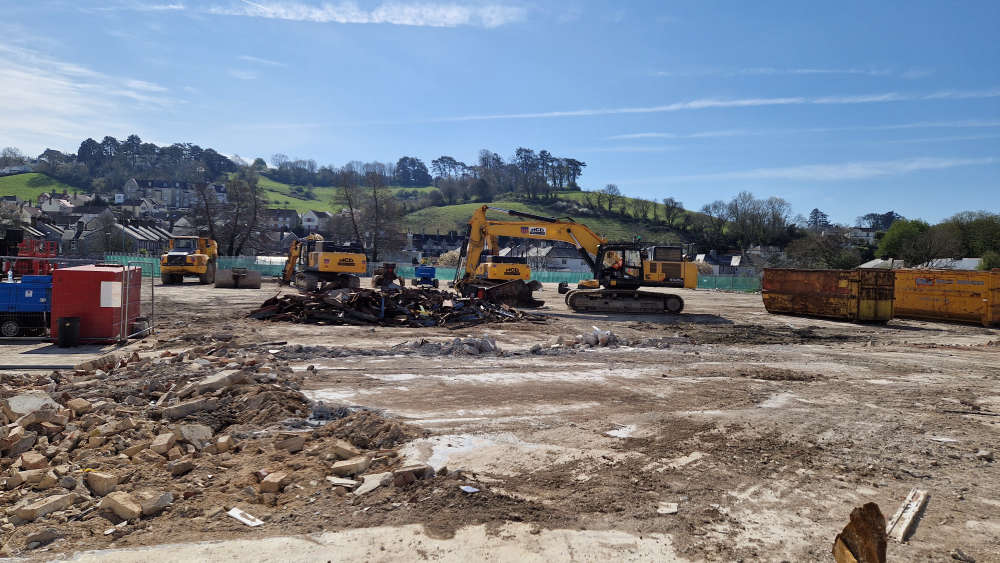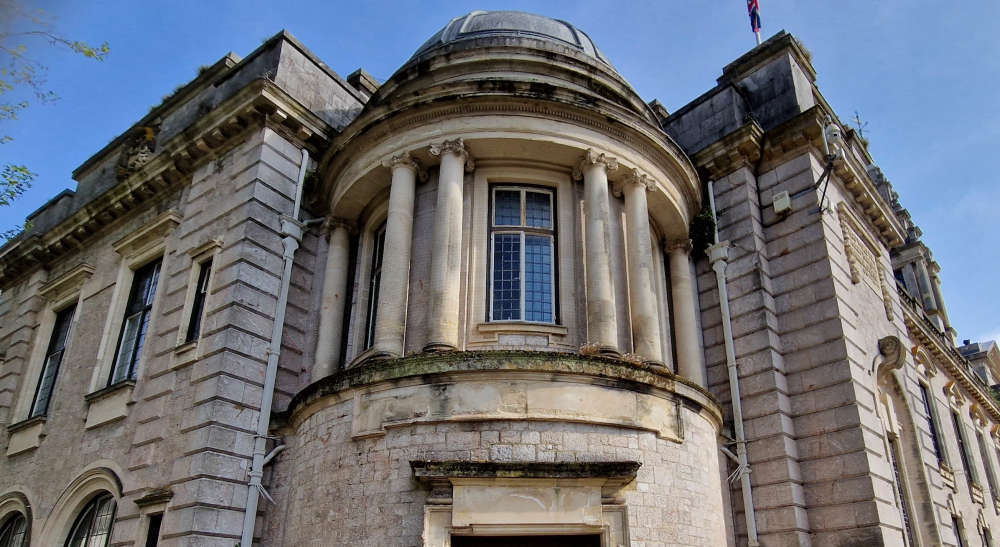
Where the parties stand ahead of council vote on 5 May
Voters in Exeter will head to the polls next week to elect almost half of the city council.
A total of 17 seats out of 39 are up for grabs – 13 in line with the usual cycle of a third every election year, as well as four extra seats because of vacancies.
Labour currently has a comfortable majority in the city with 24 councillors, while Conservatives (6), Lib Dems (2), Greens (2) and a single independent make up the rest.
Labour, Conservatives and the Greens will be contesting every seat on polling day, as will the Liberal Democrats apart from in St Loyes. Also standing for election are three candidates from the For Britain Movement – a right-wing, anti-immigration group – and one independent.
Ahead of next Thursday’s vote [5 May], the Local Democracy Reporting Service looks at the manifestos from each of the parties standing.
Labour
Exeter’s ruling Labour group focusses on four key themes: ‘A net zero carbon city, our communities and homes, a healthy and active city, and a thriving local economy and well-run council’.
To help meet the 2030 net zero target, Labour says it will electrify the council’s fleet of vehicles, continue to rollout kerbside food waste collections, replace double the trees lost through ash-dieback and launch a new public electric vehicle charging strategy.
On communities and homes, it will continue to build new council housing to high energy-efficiency standards and retrofit thousands of existing homes, tackle homelessness and “explore the development of new community wellbeing hubs” in Pinhoe and Whipton.
Labour’s document also outlines how the party will “create a business case for our own new residential property company to build and acquire rented homes with the security of an ethical landlord and secure tenancies not seen in the private sector.”
Policies for a ‘healthy and active city’ include improving access for walking and cycling, a 12-week wellbeing programme for residents through the council-run leisure service, investment in playing fields and refurbishment of the city parks’ paddling pools.
Labour says it will also protect valley parks in partnership with Devon Wildlife Trust and work on ‘rewilding’ the city.
Outlining how footfall in the city is back to 82 per cent of pre-pandemic levels, the party claims its flagship new St Sidwell’s Point leisure centre “will play a vital role in our recovery, by supporting the city centre and acting as a catalyst for the redevelopment of the wider area.”
In his foreword, leader Phil Bialyk adds: “It has been a year of recovery for Exeter as we cautiously start to move on from the pandemic. We are seeing the rewards of the work we did with our partners across the city last year, in supporting and coordinating the response to the pandemic crisis. This has given us the best possible chance of a sustainable recovery.”
Full manifesto: https://www.exeter-labour.org.uk/wp-content/uploads/sites/200/2022/03/Exeter-Labour-Manifesto-2022.pdf
Conservatives
The largest opposition party heading into the election, the Conservatives have entitled their manifesto: ‘Transforming Exeter’.
Leader Andrew Leadbetter says it “delivers the world class public services Exeter residents deserve, in a sustainable and cost-effective way that is fair to current and future taxpayers.”
The document outlines how a Tory-led council “can and will” stop the authority’s debt from rising, adding the party will “ensure prudent and balanced budgets that provide Exeter with the world class services that are needed.”
It says the current national policy of shared students houses not paying council tax “has to change,” with a call to alter legislation and make new purpose-built student flats liable for business rates.
The Tories promise to freeze Exeters car parking charges for the next two years and to “urgently work” to develop a new park and ride facility. They will also seek further government grants to ensure the new railway station at Marsh Barton is completed [it is due to open towards the end of this year] and enable a new station at Hill Barton to progress.
On the environment, policies include new electric charging points in “convenient locations,” more trees and review whetherthe work of ‘Exeter City Futures’ – a community interest company working on making Exeter carbon neutral and congestion-free – should be taken in-house.
The party says it will prioritise the rollout of kerbside food waste, currently only offered in Alphington, across the city . The Tory manifesto accuses Labour of “years of dither.” However a council report recently claimed it was struggling to source the vehicles and drivers needed to increase food waste collections.
The manifesto says the Tories will give no further permission for purpose-built student flats or shared housing, and may potentially expand the area of the city which prohibits more homes of multiple occupation (HMOs).
On new developments, it claims “many of the new buildings already built and planned for the city centre do not reflect the need for sympathetic and quality designs” and would introduce “proper pre-planning with developers.”
Full manifesto: https://www.exeterconservatives.co.uk/sites/www.exeterconservatives.co.uk/files/2022-04/City%20Manifesto%202022%20-%203rd%20Draft.pdf
Liberal Democrats
Heading into the election with two seats, the Lib Dems want to “reorder the city council’s priorities and divert resources back to the communities that are providing them.”
The party accuses Labour of “squandering millions” on “city centre vanity schemes.” They promise to continue what they call a ‘Progressive Group’ partnership with the Green Party and Independents.
The Lib Dems say they would start building more affordable and eco-friendly council homes, set up an Exeter homelessness taskforce that “brings together mental health services, housing associations and charities,” and potentially clamp down on new ‘co-living’ blocks – which are generally rooms for rent in large new blocks.
On the environment, a Lib Dem-led city council would introduce kerbside food waste and glass recycling, claiming the city’s rate of recycling was “ahead of the curve” when the party led the council more than a decade ago. It also wants to deliver cheaper bus fares and better services, while encouraging greater involvement with the Devon Wildlife Trust and Exeter University.
The manifesto also focusses on safer streets for Exeter, detailing how it would work with residents, night-time economy partners, charities, the university and the county council. They want more street lighting, better CCTV and measures to prevent drinking spiking and injecting.
Lib Dems would “ensure proper funding for front-line services….to ensure our city is clean, thriving and safe.” It claims “getting the basics right” would free up resources for safety, environmental and affordable housing schemes.
Finally, the party commits to hiring a full-time planning enforcement officer directly employed by the council – not from an agency – and to have “properly-resourced scrutiny” to hold the authority to account, criticising the current level of transparency.
Full manifesto: https://exeterlibdems.org.uk/en/page/our-manifesto-in-full
Green Party
Hoping to build on the 2021 local elections which they claim were the “best ever” for the party, the Greens promise “independent voices on the council that will put your area and its needs first.” They currently have two councillors.
The party proposes “real action to ensure Exeter meets its pledge to be carbon neutral by 2030,” including a city-wide carbon reduction budget, community engagement and the creation of a locally owned fund to provide investment.
They intend to promited ‘green’ local jobs, such as through a ‘modern market’ in the city centre which focuses on “supporting new and small businesses and promoting local affordable food.”
On housing, the party wants to ensure “decent new zero carbon housing” that is affordable, with low running costs, together with support for community-led, cooperative and self-build schemes for low-cost housing. The Greens will also challenge Labour’s plans for the council to “profit from” a residential property company.
If the Greens take control of the city, they will make Exeter a 20 mph city and ensure low carbon, active travel measures like walking, cycling and public transport are “safe, convenient and affordable and so tackle the city’s poor air quality.”
The manifesto also expresses support for low-traffic neighbourhoods.
The party calls for an “open, transparent and democratically run council,” with increased scrutiny, and they will push Labour to “keep their promise on the stalled new kerbside food waste collection,” describing the 26 per cent recycling rate in the city as “dismal.”
The manifesto concludes: “Green councillors are committed to working together and cooperating with other parties on areas of common ground and building on the success of the Progressive Group of councillors.”
Full manifesto: https://exeter.greenparty.org.uk/why-vote-green/
For Britain Movement
For Britain, which describes itself as a “centre-right political party that believes in small government and individual liberty,” is fielding candidates in three of the 13 wards – Exwick, St Thomas and Topsham.
It already has 10 councillors across the country.
Frankie Rufolo, one of the hopefuls in Exeter, says his party would hold local referenda on major planning applications, remove the EU flag from the Exeter Guildhall and is opposed to any rise in council tax, parking charges or bus fares.
It would also call on the county council to keep more lampposts on after half past midnight, support a fully staffed CCTV control room, as well as backing “proper community policing to deal with anti-social behaviour in the city centre, Newcourt and in Exwick Cemetery.”
For Britain opposes more student flats or co-living developments and would “prioritise veterans and local people in the provision of local services such as housing.”
On transport, it would deregulate the advertising on public transport to improve bus services and allow two hours free parking in the city centre per week, and is against the active travel road restrictions introduced during the pandemic.
Mr Rufolo says the party “opposes all building on green land” and would scrap plans for net zero carbon by 2030, instead focussing on “tackling micro-plastics in the River Exe.” They support the reopening of public toilets in Exwick and Cowick Street and a new grammar school for the city.
Paul Mouland (Independent)
The only independent standing in the election in St Thomas, Paul Mouland is the founder and director of Freemoovement, a local not-for-profit organisation that aims to improve the health of local residents, and is also an associate trainer for a national mental health charity.
In an online blogpost, he says if elected he will “represent, champion and stand-up for St Thomas to make sure it gets the appropriate support and resources it deserves.”
Mr Mouland adds there are “areas, projects and services delivered in St Thomas that could be improved. For example, recycling, sustainable travel infrastructure and the cleanliness of local parks and open spaces.”
 MP highlights Devon's dentistry 'crisis'
MP highlights Devon's dentistry 'crisis'
 Work on ‘once-in-a-generation’ Newton Abbot project back on track
Work on ‘once-in-a-generation’ Newton Abbot project back on track
 Complaints made after animal activity licence backlog
Complaints made after animal activity licence backlog
 City draw at home
City draw at home
 Cars damaged in bid to buy cheaper
Cars damaged in bid to buy cheaper
 Torbay Council considers 'fire and re-hire' in pensions wrangle
Torbay Council considers 'fire and re-hire' in pensions wrangle
